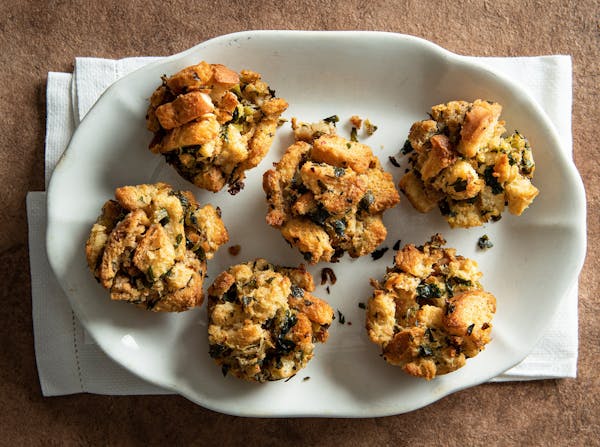Cooking a turkey isn't difficult, but there are important steps to take to ensure you don't have delightfully crisp skin on the outside, and underdone meat on the inside. We've accumulated plenty of tips over the years, so we're sharing some of the most useful ones, whether you're a first-time Thanksgiving host or a veteran looking to switch things up.
Turkey 101: Local cookbook author and Taste columnist Beth Dooley offered general turkey advice, which includes rinsing the turkey thoroughly and patting it dry before roasting. "Better yet, set the rinsed, patted turkey on a deep platter or in a pan and refrigerate overnight. This draws out excess moisture so the skin roasts up crisp and crackly." She also reinforced the importance of using a meat thermometer to check for doneness, inserting it into the thickest part of the thigh, making sure it's not touching the bone.
More pre-roast strategies: Chef Karyn Tomlinson cautions about putting a cold turkey in a hot oven. "The turkey should temper a bit before it's roasted. Let it sit on the counter for about an hour or two, so it doesn't go into the oven stone cold. You don't want it blasted by heat on the outside while it stays cold on the inside."
Butter can make everything better: After you've prepped the turkey (remove giblets, pat the turkey dry and trim the excess fat), start at the neck cavity and loosen the skin toward the breast using your fingers at first, then a thin spatula. You'll want to loosen the skin under the entire breast, legs and thighs. Mix together 2 tablespoons of butter, 2 tablespoons of canola oil and 3 tablespoons of fresh herbs (sage, thyme, rosemary, marjoram or a mixture), salt and pepper. Rub mixture under the loosened skin, squeeze lemon juice over the entire turkey and it's oven-ready.
Don't hold the mayo: The secret to crispy skin? Chef Adam Eaton insists that it's mayonnaise. "I know that people like to rub butter on a turkey, but I like mayonnaise. It gives the turkey an even browning. It doesn't run down the side of the turkey, it sticks to it a little better than butter. And it keeps the inside extremely moist. I use tons of mayonnaise and rub it all over the bird, just a thin coating. It's kind of gross, for sure, but it works. You have to make sure that the skin is absolutely dry before you rub in the mayonnaise, and you have to use real mayonnaise." That means step away from the Miracle Whip.
Be patient: The aroma of turkey has filled the house for hours, and you can't wait to dive in. But chef Denny Leaf-Smith says resist the urge. "The hardest part is at the end. I take the turkey out of the oven when the internal temperature is about 158-ish degrees. Everyone says 160, or 165. But for a large bird, the internal temperature will continue to rise after you take it out of the oven, so I pull it a little earlier. But whenever you take it out, don't touch it. ... Wait. Give the turkey time to redistribute all the juices. Rather than carve the turkey, find entertainment somewhere else. Make a lap around the room. Fill empty glasses. Just do something. I try for at least 20 minutes. Twenty-five would be pretty great."
Keeping things small: Cookbook author and Star Tribune columnist Meredith Deeds developed a Thanksgiving Sheet-Pan Dinner during the height of the pandemic, but it's worth repeating. If small and simple is your style, this meal is just the ticket.
Help is just a text away: Butterball has remained steadfast in its support of Thanksgiving cooks. You can call 1-800-BUTTERBALL, or text 844-877-3456 to chat with turkey experts. Or visit butterball.com/how-to if you have questions that range from how to thaw a turkey (best is in the fridge, allowing one day for every 4 pounds of turkey), cooking methods (roasting, grilling, smoking, frying or spatchcock), cooking temps (325 degrees), cooking time (allow 10-15 minutes per pound) and more.

The 5 best things our food writers ate this week

A Minnesota field guide to snow shovels: Which one's best?

Summer Camp Guide: Find your best ones here

Lowertown St. Paul losing another restaurant as Dark Horse announces closing

